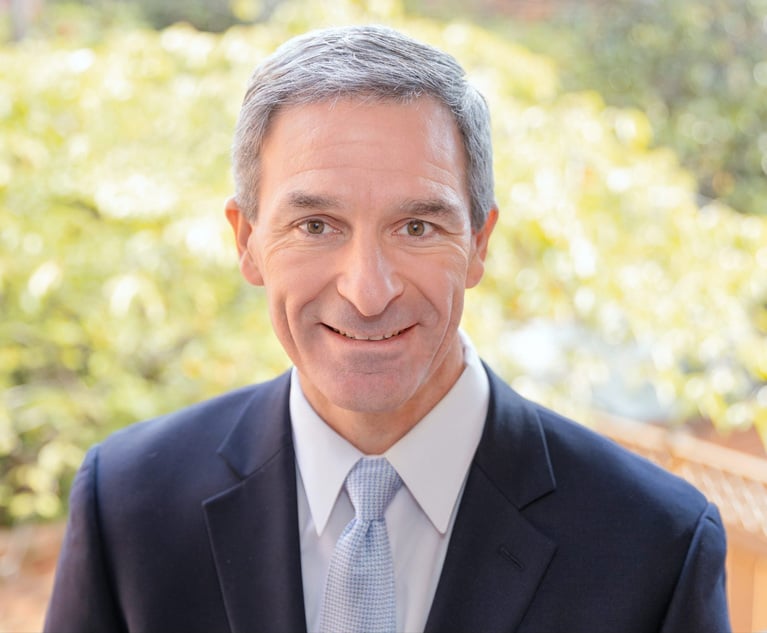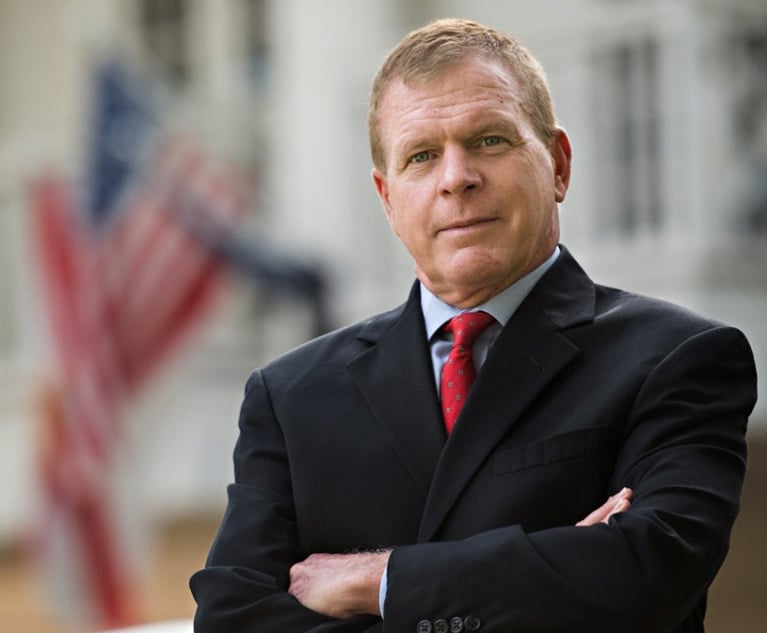Can Your Political Campaign Call Me? The TCPA and Political Robocalls
Time will tell whether autodialed political calls to cellphones, including text messages, will be allowed without prior express consent.
October 04, 2018 at 11:59 AM
6 minute read

Political speech is among our most treasured freedoms. As Benjamin Franklin noted, “Whoever would overthrow the liberty of a nation must begin by subduing the freeness of speech.”
Indeed, in 281 Care Comm. v. Arneson, the U.S. Court of Appeals for the Eighth Circuit noted the well-settled principle that political speech is “at the core of the protection afforded by the First Amendment.” In recent years, political organizations and others have mounted challenges to the Telephone Consumer Protection Act, and to various state statutes governing so-called robocalls to cellphones, on the basis that certain prohibitions restrict political speech.
In Reed v. Town of Gilbert, the U.S. Supreme Court held in 2015 that the First Amendment “prohibits the enactment of laws abridging the freedom of speech” and deprives the government of the “power to restrict expression because of its message, its ideas, its subject matter or its content.” Whether the TCPA abridges those rights with respect to political speech is being litigated around the country and courts have come to differing conclusions.
The TCPA was enacted in 1991 to address privacy concerns implicated largely by commercial robocalls, which invaded an individual's privacy in his or her residence or otherwise. Congress addressed this privacy concern by making it unlawful “to make any call (other than a call made for emergency purposes or made with the prior express consent of the called party) using any automatic telephone dialing system or an artificial or prerecorded voice” to any cellphone, and to make calls with an artificial or prerecorded voice to residential lines. See 47 U.S.C. §227(b)(1)(A)(iii) and (B).
On their face, these provisions were generally held to be content-neutral restrictions on how calls are made. However, in 2015, the statute was amended to allow the use of an ATDS or artificial voice without prior express consent for calls made “to collect a debt owed to or guaranteed by the United States.” Budget Act §301(a)(1) (adding 47 U.S.C. §227(b)(2)(H)). Additionally, in In re Cargo Airline Ass'n Petition for Expedited Declaratory Ruling, Rules & Regulations Implementing the Tel. Consumer Prot. Act of 1991, Declaratory Ruling, 29 FCC Rcd. 3432 (March 27, 2014), and In re Am. Ass'n of Healthcare Admin. Mgmt., Petition for Expedited Declaratory Ruling, Rules & Regulations Implementing the Tel. Consumer Prot. Act of 1991, Declaratory Ruling, 30 FCC Rcd. 7961 (July 10, 2015), the Federal Communications Commission created exceptions from the prior express consent requirements for package deliveries and health care-related communications. These revised regulations allowing changes impact the “content-neutral” aspect of the TCPA since certain types of speech more than others have called into question the content neutrality of the TCPA, particularly with respect to political speech.
Recent challenges to the constitutionality of the TCPA have focused on whether the debt collection exemption, and in some cases, the package delivery and health care exemptions, are content-based restrictions requiring analysis using the standard of strict scrutiny. In Gallion v. Charter Commc'ns, the U.S. District Court for the Central District of California reaffirmed that in order to find a statute constitutional under principles of strict scrutiny, the court must find that the restriction furthers a compelling interest and is narrowly tailored to achieve that interest.
Gallion and other recent cases such as Brickman v. Facebook; Holt v. Facebook; Mejia v. Time Warner Cable; Greenley v. Laborers' Int'l Union of N. Am. have upheld the TCPA, finding that although it is now a content-based restriction, it survives strict scrutiny review on the basis that it is narrowly tailored to achieve the compelling interest of safeguarding privacy, and there are no less restrictive alternatives that are at least as effective in achieving the legitimate purpose of the TCPA.
These constitutional challenges are not unique to the TCPA. Many states have some version of the TCPA and the constitutionality of those statutes has also been challenged. In several cases, those challenges have been rejected. For example, in Victory Processing v. Fox, the U.S. District Court for the District of Montana upheld a state statute which expressly prohibited political robocalls unless permission of the called party is first obtained by a live operator.
Similarly, in Patriotic Veterans v. Zoeller, the U.S. Court of Appeals for the Seventh Circuit disagreed with the plaintiff's argument that the First Amendment required an exception for political speech. However, several of the state statutes have been held unconstitutional as courts have found that the statutes were content-based and did not survive strict scrutiny.
In Cahaly v. LaRosa, the U.S. Court of Appeals for the Fourth Circuit held that the South Carolina statute governing robocalls was unconstitutional on the basis that the statute is content-based, is therefore subject to strict scrutiny and is both overinclusive and underinclusive. In Gresham v. Rutledge, the U.S. District Court for the Eastern District of Arkansas held that the anti-robocall statute at issue was a restriction on political speech and failed the strict scrutiny test. In addition, in Victory Processing v. Michael, the U.S. District Court for the District of Wyoming found the Wyoming robocall statute unconstitutional on the basis that the statute is content-based, overinclusive, and prohibits political speech while allowing commercial speech under certain circumstances.
This trend of determining whether the TCPA and similar state statutes are content-based restrictions in light of the 2015 amendment and recent FCC exceptions, and whether they can survive strict scrutiny, may continue with a pending appeal in the Fourth Circuit filed by both Democratic and Republican parties and PACs, as well as bipartisan organizations in American Association of Political Consultants, Democratic Party of Oregon, Public Policy Polling, Washington State Democratic Central Committee and Tea Party Forward PAC v. Federal Communications Commission. The fact that the Cahaly case, which held the TCPA-like South Carolina statute unconstitutional, was also in the Fourth Circuit breathes some hope into the arguments regarding the unconstitutionality of the TCPA in the American Ass'n of Political Consultants case.
Because of the 2015 amendment and FCC exemptions, these types of challenges to the TCPA have more teeth. Time will tell whether autodialed political calls to cellphones, including text messages, will be allowed without prior express consent. Given the now-ubiquitous nature of cellphones, it is largely one of the few ways political campaigns can reach their constituents to encourage them to vote, to get involved, or to receive information. As such, any restriction on this most precious of freedoms must be carefully scrutinized to ensure that these restrictions do not run afoul of the First Amendment.
Debra Bernard is a partner in Perkins Coie's commercial litigation practice. She represents clients in class action defense of claims under the Illinois Biometric Information Privacy Act, the Telephone Consumer Protection Act, and other consumer, commercial litigation and privacy claims.
This content has been archived. It is available through our partners, LexisNexis® and Bloomberg Law.
To view this content, please continue to their sites.
Not a Lexis Subscriber?
Subscribe Now
Not a Bloomberg Law Subscriber?
Subscribe Now
NOT FOR REPRINT
© 2025 ALM Global, LLC, All Rights Reserved. Request academic re-use from www.copyright.com. All other uses, submit a request to [email protected]. For more information visit Asset & Logo Licensing.
You Might Like
View All


Restoring Antitrust: Returning to the Consumer Welfare Standard
Trending Stories
- 1ACC CLO Survey Waves Warning Flags for Boards
- 2States Accuse Trump of Thwarting Court's Funding Restoration Order
- 3Microsoft Becomes Latest Tech Company to Face Claims of Stealing Marketing Commissions From Influencers
- 4Coral Gables Attorney Busted for Stalking Lawyer
- 5Trump's DOJ Delays Releasing Jan. 6 FBI Agents List Under Consent Order
Who Got The Work
J. Brugh Lower of Gibbons has entered an appearance for industrial equipment supplier Devco Corporation in a pending trademark infringement lawsuit. The suit, accusing the defendant of selling knock-off Graco products, was filed Dec. 18 in New Jersey District Court by Rivkin Radler on behalf of Graco Inc. and Graco Minnesota. The case, assigned to U.S. District Judge Zahid N. Quraishi, is 3:24-cv-11294, Graco Inc. et al v. Devco Corporation.
Who Got The Work
Rebecca Maller-Stein and Kent A. Yalowitz of Arnold & Porter Kaye Scholer have entered their appearances for Hanaco Venture Capital and its executives, Lior Prosor and David Frankel, in a pending securities lawsuit. The action, filed on Dec. 24 in New York Southern District Court by Zell, Aron & Co. on behalf of Goldeneye Advisors, accuses the defendants of negligently and fraudulently managing the plaintiff's $1 million investment. The case, assigned to U.S. District Judge Vernon S. Broderick, is 1:24-cv-09918, Goldeneye Advisors, LLC v. Hanaco Venture Capital, Ltd. et al.
Who Got The Work
Attorneys from A&O Shearman has stepped in as defense counsel for Toronto-Dominion Bank and other defendants in a pending securities class action. The suit, filed Dec. 11 in New York Southern District Court by Bleichmar Fonti & Auld, accuses the defendants of concealing the bank's 'pervasive' deficiencies in regards to its compliance with the Bank Secrecy Act and the quality of its anti-money laundering controls. The case, assigned to U.S. District Judge Arun Subramanian, is 1:24-cv-09445, Gonzalez v. The Toronto-Dominion Bank et al.
Who Got The Work
Crown Castle International, a Pennsylvania company providing shared communications infrastructure, has turned to Luke D. Wolf of Gordon Rees Scully Mansukhani to fend off a pending breach-of-contract lawsuit. The court action, filed Nov. 25 in Michigan Eastern District Court by Hooper Hathaway PC on behalf of The Town Residences LLC, accuses Crown Castle of failing to transfer approximately $30,000 in utility payments from T-Mobile in breach of a roof-top lease and assignment agreement. The case, assigned to U.S. District Judge Susan K. Declercq, is 2:24-cv-13131, The Town Residences LLC v. T-Mobile US, Inc. et al.
Who Got The Work
Wilfred P. Coronato and Daniel M. Schwartz of McCarter & English have stepped in as defense counsel to Electrolux Home Products Inc. in a pending product liability lawsuit. The court action, filed Nov. 26 in New York Eastern District Court by Poulos Lopiccolo PC and Nagel Rice LLP on behalf of David Stern, alleges that the defendant's refrigerators’ drawers and shelving repeatedly break and fall apart within months after purchase. The case, assigned to U.S. District Judge Joan M. Azrack, is 2:24-cv-08204, Stern v. Electrolux Home Products, Inc.
Featured Firms
Law Offices of Gary Martin Hays & Associates, P.C.
(470) 294-1674
Law Offices of Mark E. Salomone
(857) 444-6468
Smith & Hassler
(713) 739-1250









